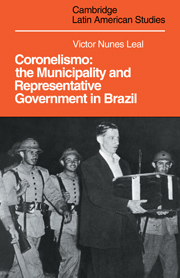Book contents
- Frontmatter
- Contents
- Editor's note
- Introduction by Alberto Venancio Filho
- A note on the term coronelismo
- 1 Notes on the structure and functioning of coronelismo
- 2 Powers of the municipalities
- 3 The elective principle in municipal administration
- 4 Municipal revenue
- 5 Organisation of the police and the judiciary
- 6 Electoral legislation
- 7 Conclusion
- Notes
- Bibliography
- Frontmatter
- Contents
- Editor's note
- Introduction by Alberto Venancio Filho
- A note on the term coronelismo
- 1 Notes on the structure and functioning of coronelismo
- 2 Powers of the municipalities
- 3 The elective principle in municipal administration
- 4 Municipal revenue
- 5 Organisation of the police and the judiciary
- 6 Electoral legislation
- 7 Conclusion
- Notes
- Bibliography
Summary
Evaluation of coronelismo: its consequences. Signs of crisis in the system. Perspectives.
On the basis of the preceding observations, we are already able to summarise in a confident fashion the principal characteristics of coronelismo, whose apparent simplicity thinly disguises an underlying complexity.
Although its consequences are felt all through the country's political life, coronelismo operates in the limited field of local government. Its habitat is the municipalities of the interior, that is to say the rural or predominantly rural municipalities; its strength is in inverse proportion to the development of urban activities like commerce or industry. Consequently, isolation is an important factor in producing and maintaining this phenomenon.
If we take isolation to mean the absence or sparse representation of public power, coronelismo can immediately be seen as a form of incursion by private authority into the political domain. Hence the temptation to consider it merely as a legacy of survival from the colonial period, when manifestations of the hypertrophy of private power were frequent, disputing prerogatives which should properly belong to institutional authority. It would be wrong, however, to identify the patriarchalism of colonial times with coronelismo, which was at its most powerful during the First Republic. It would also be out of the question to give this name to the powerful influence which large economic groups have exercised over the state in modern times.
- Type
- Chapter
- Information
- CoronelismoThe Municipality and Representative Government in Brazil, pp. 135 - 142Publisher: Cambridge University PressPrint publication year: 1977



